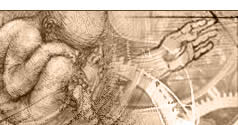 |
 |
 |
 |
 |
 |
 |
 |
|
 |
 |
 |
93 Human creativity
|
| Menu | back |
Creativity creates something new. Not only artists are creative: automotive engineers, road building engineers, programmers, housewives, and students all find solutions to complex problems and create things that did not exist before. Our ability to create new things and to figure out the secrets of the universe and the material world could derive from the fact that we are creatures made in the image of the God who created it all.
Human creativity is practically unlimited when it comes to researching and creating complex systems. The Bible says that we were made second only to God (1). So were we created in Gods own image, in the image of the creator of the entire universe (2)? Or are we ourselves the highest authority on Earth? Did we create the idea of God? Or are we all thoughts in His mind?
According to evolutionary theory, one might assume that we are superior to all other creatures on Earth. Richard Dawkins was thinking along similar lines when he wrote that any creative intelligent sufficiently complex to form and create something can only come to be as the final product of a long process of gradual evolution (3).
In contrast to this, the Bible says that God, the creator of all human abilities. Is, who He is" and has been for all eternity. Yahweh, the Hebrew name of God, is translated as, "I am that I am.
If we imagine God to be an eternal spirit and an eternal founding principle, He cannot be said to have developed over time. When the proponents of evolution state that life will necessarily come to be on any planet that possesses the necessary preconditions, they are also stating a belief in a founding principle of life that is what it is and has always been and inevitably creates life. In the final analysis, they believe in the same cause as a person who believes in God, namely a cause of all things that has existed for all eternity.
Cause and effect:
Everything that arises from a previous something must have been contained in that previous something in some form.
A cause may have many different effects, but none of the effects can be quantitatively larger or qualitatively more enhanced than the cause. This is made clear by the law of conservation of energy, the first law of thermodynamics.
Since we humans possess consciousness, it makes sense to conclude that the cause of our existence would also possess consciousness. Energy comes only from energy, life comes only from life, and consciousness comes only from consciousness. This is certainly plausible. Or is it conceivable that we, the final product of a long development, should be the first to think about our own existence and be able to attain to consciousness of ourselves? There are also some evolutionists who hold the opinion that we are not the most highly-developed creatures in the universe. The aliens in whom many of them believe are supposed to be superior to humans on Earth, comparable to the supernatural beings of the religions.
Aspects that must not be forgotten in relation to the developments we are witnessing today:
|
| a) |
How is it that living beings can adapt to their surroundings? They can do this because they already have pre-programmed mechanisms that facilitate such adaptation.
|
| b) |
Why have human technologies made progress? Because humans already have a creative brain, a creative mind.
| |
The human brain:
The different opinions entertained over the years in the history of brain research make it clear how little we still know concerning the function of our brain and our cognitive abilities.
In the middle of the nineteenth century, physician Rudolf L.K. Virchow discovered the so-called glial cells. His assumption that these cells served to support and hold other structures was the basis for the name he gave them. Glia is derived from the Greek for glue. Human nervous tissue contains a much higher proportion of glial cells than a does animal nervous tissue. Glial cells are smaller than nerve cells and make up about fifty percent of the brain. The human brain contains about ten to fifty times more glial cells than neurones.
Until recently it was thought that these cells form a supportive framework for the nerve cells and at the same time provide the mutual electrical insulation required by the nerve cells. More recent insights have shown that glial cells play an important role in mass and fluid transport as well as in the maintenance of cerebral homeostasis.* They also contribute to information processing, storage, and conduction.
The discovery of these functions a few years ago marked the real beginning of research on the human brain.
* Homeostasis (balancing capacity) refers to the constant effort exerted by an organism to interadapt various different physiological functions and maintain a constantly-balanced status for as long as possible. In this respect, reference is made in particular to one of the smallest regions in the brain, the so-called hypothalamus, an overriding signal-switching centre located at the base of the brain that is also an important integrative organ for regulation of the bodys internal milieu.
These 94 | Menu |
back
|
References:
|
| (1) |
The Bible, Psalm 8,6. |
| (2) |
The Bible, Genesis 1,27. |
| (3) |
Richard Dawkins, The God Delusion, Bantam Press, 2006. | |
| |
Comment this Site!
|
 |
 |
 |
 |
|

